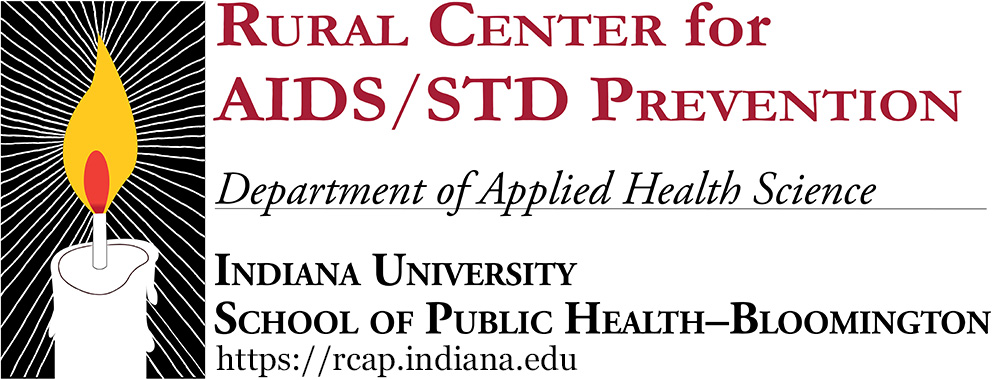Today's rural communities, despite their stereotypical "safe" image, are not immune from many of the problems of urban areas, such as unprotected sexual behavior, drug and alcohol abuse, and diseases such as human immunodeficiency infection, acquired immunodeficiency syndrome and other sexually transmitted diseases. The spread of HIV and other STDs to rural areas of the United States is an important threat to public health. Multiple factors, such as stigma, denial and isolation, contribute to the challenge of HIV/STD prevention in rural communities.
Mission of the Rural Center for AIDS/STD Prevention
Founded in 1994, the Rural Center for AIDS/STD Prevention (RCAP) promotes HIV/STD prevention in rural America to reduce HIV/STD prevalence. RCAP is headquartered at Indiana University in the Department of Applied Health Science, School of Public Health – Bloomington. RCAP:
- provide current prevention resources to professionals and the public
- develops and evalutes educational materials and approaches to rural HIV/STD prevention
- shares strategies that might work to overcome behavioral and social barriers related to rural HIV/STD prevention
Senior Director

William L. Yarber, H.S.D., Indiana University
Dr. Yarber is Provost Professor in the Indiana University School of Public Health-Bloomington, senior scientist at the Kinsey Institute, and the senior director of the Rural Center for AIDS/STD Prevention at Indiana University, Bloomington. He has authored numerous scientific reports on sexual risk behavior and AIDS/STD prevention in professional journals and has received federal grants from then national Institutes of Health, U.S. Centers for Disease Control and Prevention, and the U.S. Department of Agriculture. He is a member of The Kinsey Institute and RCAP collaboration, The Kinsey Institute Condom Use Research Team comprised of researchers from Indiana University, University of Kentucky, University of Guelph (Canada), and the University of Southampton (United Kingdom). He authored four school AIDS/STD prevention education curricula (student book and instructor guide) including the country's first secondary school AIDS prevention education curriculum, AIDS: What Young People Should Know (1989, 1987). He has been a consultant to the World Health Organization Global Program on AIDS as well as sexuality and HIV/STI-related organizations in Brazil, China, Jamaica, Poland, Portugal, and Taiwan.
Co-Directors

Gregory Carter, Ph.D., Indiana University
Gregory Carter, Ph.D. is an Assistant Professor in the Department of Community and Health Systems, Indiana University School of Nursing Bloomington. Dr. Carter has been involved with sexual health and community-based HIV prevention for the previous 17 years. His research focuses on designing studies to identify barriers to HIV screening and creating community-based HIV prevention interventions. His teaching expertise focuses on a critical evaluation of community health, with specific focus on rural health disparities. Since beginning his role at Indiana University, Dr. Carter has also worked with both the Center for Rural Engagement and Sustaining Hoosier Communities. While his research interest has varied over time, a central theme defines his research trajectory: addressing disparities and barriers to healthcare access centered around harm reduction strategies. Dr. Carter's work in these areas, in conjunction with his professional experience as an Advanced Practice Nurse, lends itself to developing research to explore HIV and sexually transmitted infections in rural areas. Dr. Carter is a recipient of the Indiana University LGBT Spirit Award as well as the Indiana Rural Health Education award and holds an affiliate faculty position with the Kinsey Institute.
William Cooke, M.D.
William Cooke, M.D. graduated with honors from the Indiana University School of Medicine in 2001 and from the Ball Memorial Family Medicine residency in 2004. Since then, Dr. Cooke as practiced comprehensive family medicine in rural Austin, Indiana. In 2015, the small town where he served as the only doctor ended up with an HIV incidence higher than any country in sub-Saharan Africa. Dr. Cooke's approach called for a compassionate community where people feel safe accessing care. He built collaborations with the Recovery Community and refused to operate within a system that breeds disease, disability, and death. The results speak for themselves: almost all his patients are vitally suppressed (76% vs 49% nationally), HIV cases have plummeted by over 95%, new Hepatitis C cases have declined by more than 76%, and the recovery community has increased by more than a 1000%. Dr. Cooke authored a soon-to-be published book, Canary in the Coal Mine. The book details his experiences as the only doctor working with the rural Southern Indiana town at ground zero of the 2015 Scott County HIV outbreak—the largest concentrated outbreak of HIV in rural America's recent history. He has received national recognition for his innovative approaches: Family Physician of the Year for Indiana in 2016 and for the United States in 2019, the Doc Hollywood Award by the Indiana Rural Health Association for his service to rural Indiana, the Indiana State Health Commission's Award for Exceptional Public Health Service during the historic Southern Indiana HIV outbreak of 2015, and in 2019 he became the first physician to receive the National Pillar of Excellence Award by The Addiction Policy Forum. In 2019, Dr. Cooke received the prestigious Ryan White Distinguished Leadership Award from RCAP.

Bambi Gaddist, Dr.PH
Dr. Bambi W. Gaddist received a Bachelor of Science from Tuskegee University in the area of Physical Education and Health, a M.S in Physical Education Administration/Health from Indiana University, and completed Doctoral studies in the areas of Human Sexuality and Family Life Education at the University of South Carolina. She has committed the past 40 years of her professional life working in the area of human sexuality with a specific focus on HIV/AIDS/STI community level mobilization, behavioral intervention and research, technical assistance/capacity building, and the elimination of other health disparities. Serves as Treasurer of the National Black Women's HIV/AIDS Network, Board Member, Southern AIDS Coalition, National Southern Black HIV/AIDS Policy and Advocacy Network, and served as Chair of the South Carolina HIV/AIDS Care Crisis Task Force (2006-2012). She is a published author and consults with a host of national and local organizations including the Centers for Disease Control and Prevention, National Minority AIDS Council, ViiV Healthcare Community Advisory Board, and Gilead Sciences, to name a few. She currently serves as a COVID-19 Prevention Network Faith Ambassador to advance educational opportunities and promote access to COVID-19 vaccines throughout communities and among individuals vulnerable to COVID-19 acquistion. This community engagement model is a part of the Fred Hutch Clinical Trail Network located in Seattle, WA. Dr. Gaddist was nominated as a CNN Hero during 2008 and featured on CNN/Essence Magazine's "Recapturing The Dream" during August 2009. She is co-founder and currently serves as CEO of the South Carolina HIV Council, a 501 (c) 3, non profit HIV prevention organization, including the Wright Wellness Center, a sexual health treatment facility located in Columbia, South Carolina.

Lemuel W. Watson, Ph.D.
Lemuel W. Watson is Vice President for Diversity, Equity, and Multicultural Affairs. Provost Professor of Education and Senior Scientist at the Kinsey Institute at Indiana University. His immediate past position was Dean of the School of Education and Provost Professor at Indiana University Bloomington He is Dean Emeritus of the College of Education at the University of South Carolina and Founding Executive Director for the Center of Innovation in Higher Education. Dr. Watson was also the former Executive Director of the Center for P–20 Engagement and Dean of the College of Education at Northern Illinois University. He is former Fulbright Scholar to Belarus and Embassy Policy Specialist to the Republic of Georgia. He helps oversee Kinsey's efforts to generate collaborative education, research, and fundraising related to LGBTQ+ lives and topics. This includes research on LGBTQ+ youth mental health as part of the partnership between Kinsey and the Trevor Project, the world's most significant suicide prevention and crisis intervention organization for lesbian, gay, bisexual, transgender, queer, and questioning youth. Lemuel W. Watson has also been recognized as a scholar and researcher on underrepresented groups' issues through speaking invitations and publications over the last three decades. He has worked as a consultant on public policy and talent management issues around the world. He has authored or co-authored books, monographs, and articles related to research on leadership, underrepresented populations, LGBTQ+, and policy. He is also Series Editor for Contemporary Perspectives on LGBTQ Advocacy in Societies with IAP. His latest scholarship can be found in Unheard Voice: A Collection of Narratives by Black, Gay & Bisexual Men, Queer and Trans Advocacy in Community College, Authentic Leadership: An Engaged Discussion of LGBTQ Work as Culturally Relevant, Special Issue of Leadership Journal on Race and Leadership. Watson also has secured grants totaling more than $13 million in research funding by an array of organizations. He has been asked to share his expertise on systemic educational policy, talent management, and leadership issues, both domestically and in countries worldwide. He has been deeply engaged with the community as a personal and professional advocate through numerous arts, community, educational, and professional boards.
Co-Directors (Emeritus)
Richard A. Crosby, Ph.D., University of Kentucky, Lexington
Richard A. Crosby, Ph.D., is he DDI Endowed Professor and Chair of health behavior in the College of Public Health at the University of Kentucky in Lexington. Dr. Crosby has published extensively in the area of HIV/STD risk behavior, including studies of rural populations. He has developed and tested a condom use promotion program (known as Focus on the Future) which is now classified by the Centers for Disease Control and Prevention as an evidence-based intervention. He has edited and authored multiple college textbooks on health behavior theory and research methods. He is also a recipient of research awards from the National Institutes of Health to study condom effectiveness against non-viral sexually transmitted infections and to test a brief, clinic-based, HIV prevention designed for young African American males. He is also funded by the Centers for Disease Control and Prevention to investigate barriers to HPV vaccination and develop social marketing programs to promote vaccine uptake.
Susan L. Dreisbach, Ph.D., University of Colorado, Denver
Dr. Dreisbach is retired assistant professor in health and behavioral science at the University of Colorado, Denver. Her research has focused on HIV/AIDS risk behaviors and the context in which they occur among methamphetamine users in rural communities and among adolescents in various settings.
Beth Meyerson, MDiv, Ph.D., University of Arizona
Dr. Meyerson is currently research professor at the Southwest Institute for Research on Women, College of Social & Behavioral Sciences, Family & Community Medicine, College of Medicine, and Affiliate Faculty in the Institute for LGBT Studies, University of Arizona. Dr. Meyerson has been involved with public health policy and systems for the past 20 years. Her systems research includes the identification of need and opportunities for system expansion to increase access to sexual health services. This has included the study of alternative screening venues for cervical cancer (STD clinics) and HIV testing (pharmacy practice expansion and community health centers); as well as the study of harm reduction practices in pharmacies (PrEP, naloxone, syringes) and syringe exchange policy adoption and implementation. Dr. Meyerson's policy research focuses on policy behaviors (STD programs, local health departments), policy adoption (accreditation, syringe exchange), and policy implementation. Beth has worked throughout the United States, in sub-Saharan Africa, in India and the Caribbean.
Mohammad R. Torabi, Ph.D., M.P.H., Indiana University
Dr. Torabi is Chancellors' Professor of Health Education in the School of Public Health at Indiana University, Bloomington. His research focus has been in measurement and evaluation of school and public health education programs and factors related to individuals' decisions in the prevention of HIV/AIDS infection, drug abuse, cancer, and tobacco.
Special Assistant to the Senior Director

Jeanne White Ginder, mother of Ryan White, was appointed on April 8, 2010 by the RCAP directors as a Special Advisor to the Senior Director. Jeanne will assist RCAP in specific projects, particularly those dealing with HIV/STD education for youth. Since Ryan's death in 1990, Jeanne has been a spokesperson for AIDS education and the rights of people with AIDS. She travels the country and the world speaking to groups and has worked with Congress for the creation and continuation of the "Ryan White Care Act."
Carrie Lawrence, is a practitioner-academic and public health advocate with several years of practice experience in nonprofit and social services. Her applied research examines addressing social justice, health disparities and inequalities by empowering communities to collectively act upon their own health priorities, inform program and intervention design and development as well as health policy and system transformation. Dr. Lawrence has initiated several community-based participatory and translational research projects employing multiple methods that engage and empower community members in identifying, leveraging and sustaining local resources to promote and support individual health. Her current research explores the development of a health commons framework to address consequences of policy on local communities and cultivate empowerment through collective action of local residents to address deficits created by policy agendas counter to their goals.
Justin R. Garica, Ph.D., is Ruth Halls Associate Professor of Gender Studies and Director of Research at The Kinsey Institute, Indiana University, Bloomington. Dr. Garcia holds a MS in biomedical anthropology and PhD in evolutionary biology from Binghamton University. His research interests focus on the evolutionary foundations of variation in monogamy, intimacy, and sexual behavior, with a particular emphasis on biocultural approaches to sex, gender, dating, and reproductive strategies. He has published on a variety of topics related to romantic and sexual relationships, and is co-author (with Peter Gray) of Evolution and Human Sexual Behavior (Harvard University Press) and co-editor of Evolution's Empress: Darwinian Perspectives on the Nature of Women (Oxford University Press). He has been a scientific consultant to Teva Women's Health, K-Y, and since 2010 has been Scientific Advisor to the online dating company Match.com.
Amanda Gesselman, Ph.D., Associate Director for Research, Anita Aldrich Endowed Research Scientist, and Head of the Research Methodology and Analytics Core at The Kinsey Institute, Indiana University. Dr. Gesselman is a social-developmental psychologist who studies meaningful social relationships and trends in love, sex, and well-being, with an emphasis on technology and health behaviors. She has published on a variety of topics related to sexualities, relationships, and mental and physical health, and has been a scientific or statistical consultant for Clue, Jasmin, K-Y, Teva Women's Health, and the online dating company Match.com.
Cynthia Graham, Ph.D., is Professor of Sexual and Reproductive Health, Department of Psychology, University of Southampton, UK. She obtained her Ph.D. in Clinical Psychology at McGill University and previous appointments include: Director of Graduate Education at The Kinsey Institute for Research in Sex, Gender, and Reproduction, Clinical Professor in the Department of Gender Studies at Indiana University , and Research Psychologist at the MRC Reproductive Biology Unit in Edinburgh . Her research interests are sexual behavior, HIV/STD-related risk behavior, reproductive hormones, and gender differences in sexual behavior. She has conducted research on psychophysiological sexual response patterns; condom errors and problems; the effects of oral contraceptives on mood and sexuality in women; the relationship between the menstrual cycle and changes in mood and sexuality; menstrual synchrony; and methodological issues involved in recall data on sexual behavior.
Alison Green, Ph.D., Assistant Professor in the Department of Applied Health Science in the IU School of Public Health-Bloomington. Her research interests include evidence-based treatment, technology utilization in treatment, cost analysis, process evaluation, system-level change, mental health, juvenile drug courts, adolescent substance abuse treatment, substance use disorders, sexual health, sexual health education, health education for youth.
Timothy G . Heckman, Ph.D., is Associate Dean for Research, College of Public Health, University of Georgia, specializing in experimental health psychology. His recent research has focused primarily on the mental health needs of rural people living with HIV/AIDS. Dr. Heckman is funded by the National Institute of Mental Health to evaluate the efficacy of a telephone-delivered, coping improvement group intervention for HIV-infected persons living in rural areas and to investigate patterns and predictors of suicidal thoughts among HIV-infected rural residents.
Randolph Hubach, Ph.D., M.P.H. is Director of the Sexual Health Research Lab at Purdue University and Associate Professor of Public Health. He holds a Ph.D. in Health Behavior from Indiana University's School of Public Health and MPH from California State University, Fullerton. Early in his career, Dr. Hubach's research and practice experiences included serving as PI on a federally funded community-based sexual health intervention project, developing managed care programs for local public health and mental health jurisdictions, and serving in leadership positions in multiple community health coalitions and planning processes. As a behavioral scientist and public health researcher, he has gained a practical understanding of the challenges associated with the delivery of public health programs that are scientifically sound and responsive to the needs of diverse communities. Dr. Hubach's research interests include using community engaged principles to address sexuality-related health disparities, sexual behavior, LGBT population health, and HIV/AIDS within rural communities.
Kristen N. Jozkowski, Ph.D., Professor and William L. Yarber Endowed Professor of Sexual Health in the Department of Applied Health Science in the IU School of Public Health-Bloomington. Her research interests include sexual consent and refusal communication, sexual violence prevention, influence of alcohol intoxication on correlates of sexual assault, abortion attitudes, and survey research.
Christina Ludema, Ph.D., Assistant Professor in the Department of Epidemiology and Biostatistics in the School of Public Health-Bloomington. Her research interests are in causal inference, social epidemiology, sexually transmitted diseases, and infectious diseases.
Leandro Antonio Mena, M.D., M.P.H., is an Associate Professor of Medicine, Infectious Diseases, and Director, Center for HIV/AIDS Research, Education and Policy, at the University of Mississippi Medical Center in Jackson, Mississippi. He earned his medical degree from the Universidad Nacional Pedro Henriquez Urena in Santo Domingo, Dominican Republic, and his MPH from the Tulane University School of Public Health and Tropical Medicine in New Orleans, Louisiana. Dr. Mena is a physician with specialty training in infectious diseases. He has more than 12 years of experience in clinical and epidemiological research in the area of sexually transmitted infections (including HIV), with special interest in the dynamics of transmission and the role that social determinants of health play in perpetuating these epidemics in sexual and gender minority populations. Dr. Mena currently supervises a research team with 10 members dedicated to clinical and epidemiologic research, and serves as the medical director of the Crossroads Clinic (STD/HIV clinic in Jackson, Mississippi), the only publicly funded exclusive STD/HIV clinic in the state, and Open Arms Healthcare Center, a community based clinic that offers primary care services with an emphasis in the health care needs LGBTI populations in Jackson. MS.
Robin Milhausen is a professor in Human Sexuality and Family Relations in the Department of Family Relations and Applied Nutrition, at the University of Guelph, in Guelph, Ontario, Canada. Dr. Milhausen earned her PhD at Indiana University in the Department of Applied Health Science, while working as a research assistant at the Rural Center for AIDS/STD Prevention. Dr. Milhausen's research interests include: sexual risk-taking among rural youth, condom use errors and problems, sexual arousal and the experience of sexual problems, and gender differences in sexual attitudes and behaviors. Current research projects include: gender differences in desired partner characteristics; sexual arousal and sexual and relationship satisfaction; sexual arousal, condom use errors and problems and sexual risk-taking; scale development and validation.
Molly Rosenberg, PhD, is an assistant professor in the Department of Epidemiology and Biostatistics at Indiana University School of Public Health-Bloomington. She is an epidemiologist and population health researcher who studies how social, structural, and economic factors influence sexual health outcomes. Her work has largely focused on adolescent sexual health in rural South Africa, where the burden of the HIV epidemic continues to be felt most strongly, though her research has represented vulnerable populations of all ages in multiple low- and middle-income countries. Dr. Rosenberg's research is focused on identifying novel structural intervention targets to improve sexual health, with representative studies examining the relationship between alcohol outlets and herpes infections, the influence of school dropout on teen pregnancy, and the potential for anti-poverty programs like cash transfers and microfinance to influence HIV risk.
Stephanie A. Sanders, Ph.D., is Senior Scientist of The Kinsey Institute, Provost Professor and Reg Zeglin Brand Chair, Department of Gender Studies at Indiana University, Bloomington. A biopsychologist by training, she has conducted research on sexual behavior patterns related to risk for sexually transmitted infections; condom use errors and problems; sexual orientation and sexual behavior; sexual arousal in women; sex/gender differences in behavior; sex hormones and behavior; the effects of prenatal exposures to drugs and hormones on behavioral, cognitive and social development; and women's menstrual cycling. She has experience writing and conducting grants funded by NICHD, NIDA, NIMH, and private funding agencies. She is a PI for NIH award, Barriers to Correct Condom Use (R21 HD060447-01), which aims to advance understanding of, among other factors, the role of cognitive and affective processes and condom application skills in explaining problems with condom use, particularly condom-associated erection problems (CAEP), in young, heterosexual adult men.
Eric R. Walsh-Buhi, MPH, Ph.D., Professor and Chair of the Department of Applied Health Science, Indiana University School of Public Health-Bloomington. His research focuses on 1) understanding and promoting sexual health among young people (including HIV/STD/teen pregnancy prevention), and 2) examining the influence of and employing innovative technologies for health promotion and behavior change (called Digital Health). In conjunction with ETR, Dr. Walsh-Buhi is leading a federally-funded randomized controlled trial (RCT) to test the effectiveness of a new blended learning healthy relationships program, About Us, designed to reduce unintended pregnancy and sexually transmitted diseases (STDs) among vulnerable youth, delivered through school-based health centers in California. He is also leading a three-year $1 million grant from the Office of Health Equity, Division of STD Prevention, Centers for Disease Control and Prevention to address social determinants of health and STDs among Latino/a youth in the South Bay region of San Diego County, California.
Karen Vanterpool, MPH, Ph.D., is a research scientist in the Johns Hopkins School of Medicine and received her Ph.D. in Health Behavior, minoring in Human Sexuality at the School of Public Health at Indiana University Bloomington. Previously she worked as a Fellow for the U.S. Department of Health & Human Services and as Research Associate at the Rural South Public Health Training Center at the University of Florida where she worked on a needs assessment assessing rural residents' perceptions of HIV/AIDS service quality, access to care and health disparities. Karen's research interest includes the relationship that cultural identity and acculturation has with risk communication, risk perception and decision-making regarding sexual behaviors; and the role that risk perception plays among those at high risk for contracting HIV including those that are geographically isolated. Karen holds a Masters in Public Health from the University of Florida College of Public Health & Health Professions.
 Alyssa Lederer, PhD, MPH, MCHES is an Associate Professor in the Department of Applied Health Science at Indiana University School of Public Health-Bloomington. Dr. Lederer is an applied behavioral scientist and much of her research focuses on the design and evaluation of health promotion interventions, especially in the areas of sexuality education, sexually transmitted infections, and sexual violence prevention among adolescents and emerging adults. She is especially interested in the intersection of health education and behavior change, using mixed methods, and community-driven research. Dr. Lederer received her PhD from Indiana University-Bloomington, MPH from Emory University’s Rollins School of Public Health, and is a Master Certified Health Education Specialist.
Alyssa Lederer, PhD, MPH, MCHES is an Associate Professor in the Department of Applied Health Science at Indiana University School of Public Health-Bloomington. Dr. Lederer is an applied behavioral scientist and much of her research focuses on the design and evaluation of health promotion interventions, especially in the areas of sexuality education, sexually transmitted infections, and sexual violence prevention among adolescents and emerging adults. She is especially interested in the intersection of health education and behavior change, using mixed methods, and community-driven research. Dr. Lederer received her PhD from Indiana University-Bloomington, MPH from Emory University’s Rollins School of Public Health, and is a Master Certified Health Education Specialist.
 Kirsten Greer, M.S. is currently a doctoral student in the School of Public Health at Indiana University. Her major is Health Behavior, and she is minoring in Human Sexuality. Previously, she received her Masters Degree in Human Development and Family Studies from Michigan State University, where she conducted research that focused on the role of media and technology on sexual behaviors such as sexting, women’s pornography use, and school professionals knowledge about students online sexual experiences. Her research interests broadly lie in the process of sexual socialization and its impact on consent in adolescents and emerging adults. Specifically, she plans to investigate how the process of socialization impacts consent decisions and contributes to sexual coercion and compromised sexual agency. Her current research projects explore the role of sexual socialization and acculturation in young Latina Women and its influence on their understanding and expression of sexuality. Additionally, she is conducting research which evaluates the impact of COVID-19 on marital and relationship satisfaction with the Kinsey Institute Condom Use Research Team.
Kirsten Greer, M.S. is currently a doctoral student in the School of Public Health at Indiana University. Her major is Health Behavior, and she is minoring in Human Sexuality. Previously, she received her Masters Degree in Human Development and Family Studies from Michigan State University, where she conducted research that focused on the role of media and technology on sexual behaviors such as sexting, women’s pornography use, and school professionals knowledge about students online sexual experiences. Her research interests broadly lie in the process of sexual socialization and its impact on consent in adolescents and emerging adults. Specifically, she plans to investigate how the process of socialization impacts consent decisions and contributes to sexual coercion and compromised sexual agency. Her current research projects explore the role of sexual socialization and acculturation in young Latina Women and its influence on their understanding and expression of sexuality. Additionally, she is conducting research which evaluates the impact of COVID-19 on marital and relationship satisfaction with the Kinsey Institute Condom Use Research Team.
Brandon Merritt, M.S., CCC-SLP, is a doctoral student in the Department of Speech, Language and Hearing Sciences at Indiana University. His research focuses on the production and perception of gender information in voice and speech, particularly from gender diverse speakers. He has published in the Journal of Speech, Language, and Hearing Research and Perspectives of the ASHA Special Interest Groups, and has presented at the American Speech-Language Hearing Association Convention and the Acoustical Society of America meeting.
 Ivanka Simić Stanojević, MS is a Ph.D. student at Indiana University’s School of Public Health with a major in Leisure Behavior, holding a master’s degree in Special Education and Rehabilitation from the University of Belgrade, Serbia. With a Ph.D. minor in Sexual and Reproductive Health, Ms. Simić Stanojević’s line of research is focusing on the sexual wellness of women with disabilities. More specifically, her interest lies in improving sexual well-being and preventing sexual abuse and victimization among the highly vulnerable population with developmental and intellectual disabilities through sex-positive and LGBTQ+ inclusive sexual education, self-empowerment, and self-advocacy. Furthermore, Ms. Simić Stanojević is dedicated to exploring and establishing evidence-based practices that improve the mental health and overall well-being of individuals with developmental and intellectual disabilities. Her other research interests include investigating sexual behavior observed through the lens of leisure philosophy and exploring the most effective treatment modalities nested within the field of recreational therapy that could improve sexual wellness in individuals with disabilities. With more than a decade of NGO activism experience in promoting civil rights, equity, and social justice, Ms. Simić Stanojević’s research advocates for the rights of marginalized and underrepresented populations.
Ivanka Simić Stanojević, MS is a Ph.D. student at Indiana University’s School of Public Health with a major in Leisure Behavior, holding a master’s degree in Special Education and Rehabilitation from the University of Belgrade, Serbia. With a Ph.D. minor in Sexual and Reproductive Health, Ms. Simić Stanojević’s line of research is focusing on the sexual wellness of women with disabilities. More specifically, her interest lies in improving sexual well-being and preventing sexual abuse and victimization among the highly vulnerable population with developmental and intellectual disabilities through sex-positive and LGBTQ+ inclusive sexual education, self-empowerment, and self-advocacy. Furthermore, Ms. Simić Stanojević is dedicated to exploring and establishing evidence-based practices that improve the mental health and overall well-being of individuals with developmental and intellectual disabilities. Her other research interests include investigating sexual behavior observed through the lens of leisure philosophy and exploring the most effective treatment modalities nested within the field of recreational therapy that could improve sexual wellness in individuals with disabilities. With more than a decade of NGO activism experience in promoting civil rights, equity, and social justice, Ms. Simić Stanojević’s research advocates for the rights of marginalized and underrepresented populations.



